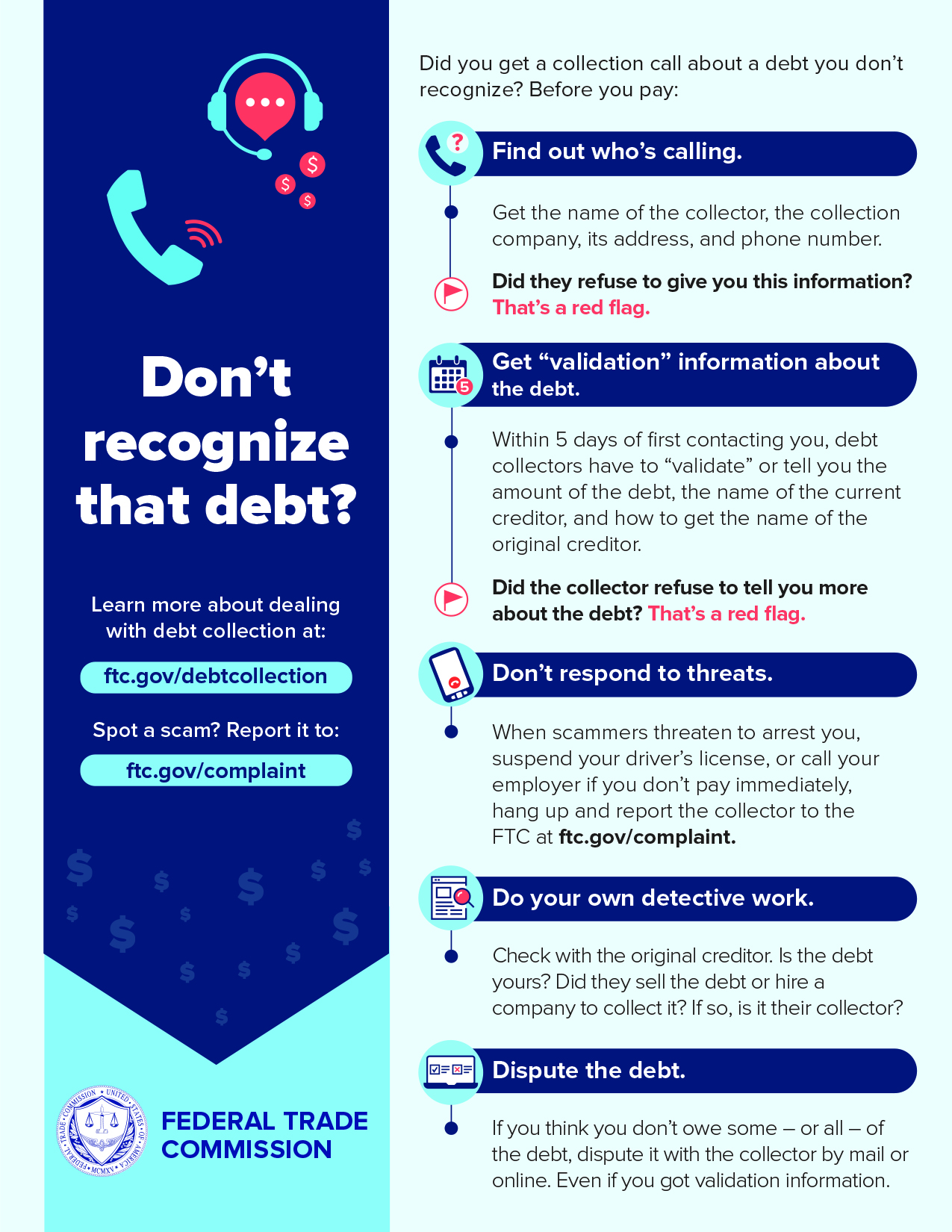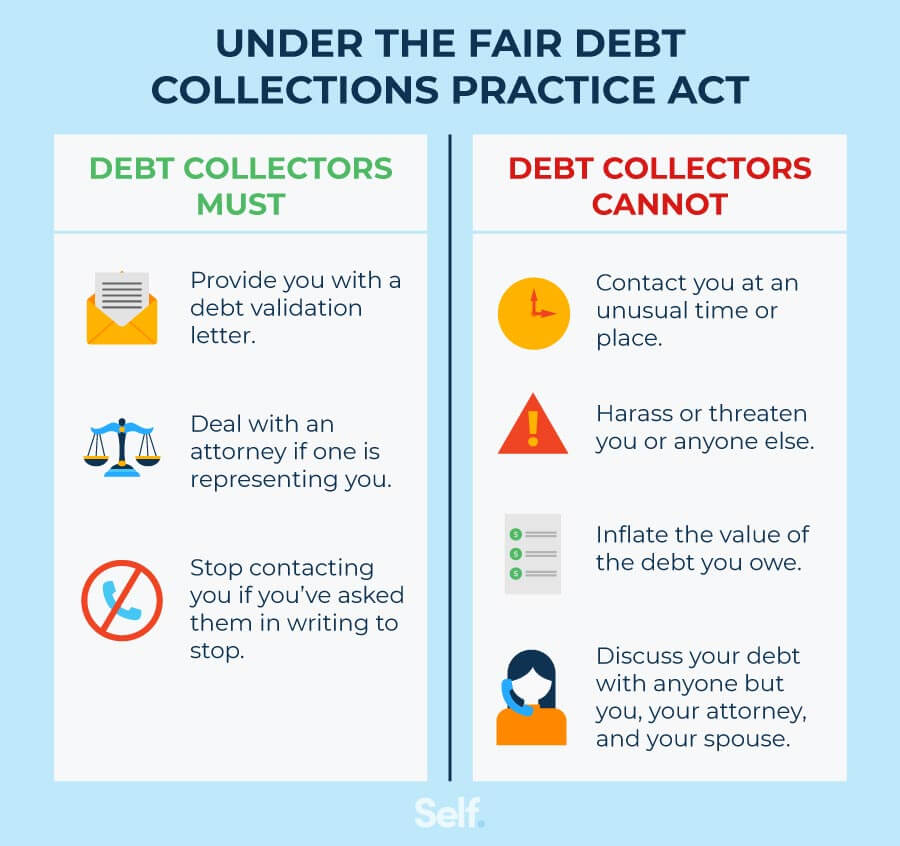Debt collection can be a stressful and confusing process. While legitimate debt collectors operate within the law, many use unethical tactics to pressure you into paying. Knowing how to identify and avoid common scams is crucial to protect your finances and your peace of mind. This article will provide you with the knowledge and tools to navigate debt collection situations effectively and avoid falling prey to deceptive practices.
Protecting Yourself from Debt Collector Scams
Know Your Rights
Debt collectors are required to follow specific laws and regulations. Understanding your rights can help you identify and avoid scams. Here are some key points:
| Right | Description |
|---|---|
| Fair Debt Collection Practices Act (FDCPA) | This law outlines the legal practices debt collectors must follow. |
| Right to Verify Debt | You can request a written validation of the debt, including the amount owed and the creditor’s name. |
| Right to Stop Contact | You can request that the collector stops contacting you. |
| Right to Dispute Debt | If you believe the debt is inaccurate or you don’t owe it, you can dispute it in writing. |
Be Wary of High-Pressure Tactics
Legitimate debt collectors will not use threats, harassment, or intimidation. Watch out for these red flags:
| Scam Tactics | Description |
|---|---|
| Threatening Arrest or Jail Time | Debt collectors cannot threaten you with arrest for failing to pay a debt. |
| Demanding Immediate Payment | They cannot force you to pay immediately or use high-pressure tactics to get you to pay. |
| False Claims of Legal Action | They should not make false claims about legal action or court appearances. |
| Impersonating Government Officials | They cannot claim to be from a government agency or law enforcement. |
Verify the Collector’s Identity
Before engaging with a debt collector, confirm their legitimacy:
| Verification Methods | Description |
|---|---|
| Request Written Information | Ask for a written statement with the debt collector’s name, address, and phone number. |
| Check the Collector’s License | Many states require debt collectors to be licensed. You can check the licensing status with your state’s consumer protection agency. |
| Look for a Debt Collection Agency License | If the collector is a debt collection agency, they must have a license. |
| Search for the Collector Online | Check the collector’s website, social media presence, and online reviews. |
Don’t Give Out Personal Information
Debt collectors should not ask for sensitive information such as your Social Security number or bank account details:
| Sensitive Information | Description |
|---|---|
| Social Security Number | Debt collectors do not need your Social Security number to collect a debt. |
| Bank Account Information | Never give your bank account information to an unverified debt collector. |
| Credit Card Numbers | Debt collectors should not ask for your credit card numbers. |
| Personal Details | Be cautious about providing personal information to unverified callers. |
Report Scams to Authorities
If you suspect a scam, report it to the authorities immediately:
| Reporting Authorities | Description |
|---|---|
| Federal Trade Commission (FTC) | The FTC is the main agency that investigates consumer complaints, including debt collection scams. |
| Consumer Financial Protection Bureau (CFPB) | The CFPB oversees the financial industry, including debt collection practices. |
| State Attorney General’s Office | Your state attorney general may have a consumer protection division that handles debt collection complaints. |
| Federal Communications Commission (FCC) | If you receive harassing or threatening phone calls, you can report them to the FCC. |
How to avoid debt collector scams?

Know Your Rights
Knowing your rights is crucial to avoiding debt collector scams. Debt collectors must follow specific legal guidelines outlined by the Fair Debt Collection Practices Act (FDCPA). They cannot:
- Harass or threaten you: This includes using obscene language, making threats of violence, or calling you at unreasonable hours.
- Misrepresent their identity: They must identify themselves as debt collectors and the name of the creditor they are representing.
- Deceive you about the amount owed: They cannot inflate the amount owed or add illegal fees.
- Contact you at work if you’ve asked them not to: This applies unless you’ve given them written permission.
Be Wary of Unfamiliar Contacts
Legitimate debt collectors will typically send you a written notice outlining the debt. Be cautious if you receive calls or emails from unknown numbers or addresses.
- Verify the information: Before providing any personal information or making payments, independently verify the debt collector’s legitimacy.
- Avoid unsolicited calls and emails: If you receive a suspicious call or email, hang up or delete it immediately.
- Don’t engage with aggressive tactics: Scammers often try to pressure you into immediate action. Resist any pressure and hang up.
Don’t Fall for Common Scams
Debt collector scams often involve common tactics designed to deceive you. Be aware of these red flags:
- Threats of arrest or legal action: Debt collectors cannot arrest you or file a lawsuit without going through proper legal channels.
- Demanding immediate payment: Legitimate collectors typically offer you a payment plan or negotiation options.
- Asking for personal information: Be wary of anyone requesting your Social Security number, bank account details, or other sensitive information over the phone.
Document Everything
Keep detailed records of all interactions with debt collectors, including:
- Dates and times of calls: Note the time, date, and content of any phone conversations.
- Written correspondence: Keep all letters, emails, or text messages you receive from the collector.
- Payment records: Maintain records of any payments made to the debt collector.
Seek Professional Help
If you suspect you are a victim of a debt collection scam, seek help from a reputable source.
- Contact your local consumer protection agency: They can provide information and guidance on handling debt collector scams.
- File a complaint with the Federal Trade Commission (FTC): The FTC handles complaints related to consumer fraud and debt collection practices.
- Consult an attorney: An attorney can provide legal advice and represent you in legal matters related to debt collection scams.
What is the 11 word phrase to stop debt collectors?

There isn’t a magic 11-word phrase that will instantly stop debt collectors. However, you can use the phrase «I’m disputing the debt» to temporarily stop collection activity.
How Does Disputing a Debt Work?
- When you dispute a debt, you are essentially telling the debt collector that you believe the debt is incorrect or that you don’t owe it.
- This triggers a process outlined by the Fair Debt Collection Practices Act (FDCPA) where the debt collector must stop collecting on the debt until they provide you with written verification of the debt.
- The debt collector must send you a validation notice with the name of the original creditor, the amount owed, and how the debt was incurred.
What Happens After You Dispute the Debt?
- You have 30 days to review the validation notice and respond to the debt collector.
- If you still dispute the debt, you must inform the debt collector in writing within 30 days of receiving the validation notice.
- If the debt collector fails to provide you with the required validation within 30 days, they are generally prohibited from taking further collection action.
What If I Don’t Dispute the Debt?
- If you don’t dispute the debt within 30 days, the debt collector can continue their collection efforts.
- However, the debt collector is still required to follow the FDCPA guidelines, which limits their ability to harass or threaten you.
Is There Anything Else I Can Do to Stop Debt Collectors?
- Consider negotiating a payment plan with the debt collector or the original creditor. This can help you manage your debt and avoid further collection activity.
- If you’re experiencing financial hardship, you may be able to seek legal advice from a non-profit credit counseling agency or a lawyer specializing in debt relief.
- If you believe the debt collector is violating the FDCPA, you can file a complaint with the Consumer Financial Protection Bureau (CFPB) or the Federal Trade Commission (FTC).
What not to do when talking to a debt collector?

Don’t be rude or disrespectful.
Debt collectors are people too, and they’re just trying to do their job. Getting angry or rude with them won’t help your situation. In fact, it could make things worse. Remember to stay calm and polite, even if you’re frustrated.
Don’t admit to owing the debt.
If you’re not sure if you actually owe the debt, don’t admit to it. This can be used against you later on. Instead, ask for proof of the debt and documentation of how much you owe.
- Ask for a validation letter that states the debt is valid.
- Request a copy of the original agreement.
- Request a detailed breakdown of the amount owed.
Don’t agree to a payment plan without understanding the terms.
Make sure you understand the total amount you’ll be paying, the monthly payment amount, and the interest rate. If you’re not comfortable with the terms, don’t agree to it.
Don’t give out personal information.
Debt collectors don’t need your Social Security number, bank account information, or other sensitive personal information. If they ask for it, politely refuse and explain that you’re only comfortable providing the information that’s necessary to discuss the debt.
Don’t ignore them.
Ignoring debt collectors won’t make them go away. It’s important to communicate with them, even if you can’t afford to make a payment right away. Communicate with them and let them know your situation. You may be able to work out a payment plan or negotiate a lower amount.
How do I defend myself against a debt collector?

Know Your Rights
The Fair Debt Collection Practices Act (FDCPA) protects consumers from unfair and abusive debt collection tactics. It is important to be aware of your rights under this law and know how to protect yourself.
- Debt collectors cannot harass or threaten you. This includes making repeated phone calls, calling you at inconvenient times, or using abusive language.
- Debt collectors must identify themselves. They must tell you who they are, the name of the creditor they represent, and the amount of the debt.
- Debt collectors cannot sue you without giving you proper notice. They must file a lawsuit in a court of competent jurisdiction and provide you with a copy of the summons and complaint.
- Debt collectors cannot contact you at work if they know your employer prohibits such contact.
- Debt collectors cannot report false information to credit reporting agencies.
Verify the Debt
If you receive a debt collection notice, the first step is to verify the debt. This means confirming that you actually owe the debt and that the debt collector is authorized to collect it.
- Ask the debt collector for written verification of the debt. This should include the name of the creditor, the amount of the debt, and the date of the last payment.
- Review your credit report to see if the debt is listed there.
- Contact the original creditor to confirm the debt.
Negotiate with the Debt Collector
If you owe the debt, you may be able to negotiate with the debt collector to reduce the amount you owe or agree on a payment plan.
- Be polite and professional when communicating with the debt collector.
- Explain your situation to the debt collector. Let them know if you have experienced a financial hardship, such as a job loss or medical emergency.
- Ask the debt collector for a temporary suspension of payments or a lower monthly payment.
- Get any agreement in writing.
Consider Legal Action
If the debt collector is violating your rights or engaging in unfair or abusive practices, you may need to take legal action.
- File a complaint with the Consumer Financial Protection Bureau (CFPB).
- Consult with an attorney.
- File a lawsuit in small claims court.
Document Everything
It is important to document everything related to your debt collection interactions. This includes:
- Keep a record of all phone calls, letters, and emails from the debt collector.
- Note the date, time, and content of each communication.
- Save any documentation you receive from the debt collector.
Frequently Asked Questions
What are some common debt collection scams?
Debt collectors may use a variety of tactics to try to scare or intimidate you into paying a debt that you don’t owe or that you can’t afford. Some common scams include:
Threatening legal action: Debt collectors may threaten to sue you or take other legal action if you don’t pay, even if they don’t have the legal right to do so.
Impersonating government officials: Some debt collectors may pretend to be from the government or a law enforcement agency in order to make you believe they have more power than they actually do.
Falsely claiming you owe more money: Debt collectors may try to add unauthorized fees or charges to your debt or inflate the amount you owe.
Harassing you with repeated phone calls: Debt collectors may call you repeatedly at inconvenient times, even after you’ve asked them to stop.
Using abusive or threatening language: Debt collectors may use profanity, curse words, or threats of violence to try to get you to pay.
Demanding payment without providing proper documentation: Debt collectors should be able to provide you with written documentation of your debt, including the amount owed, the date the debt was incurred, and the name of the original creditor.
Trying to collect a debt that is beyond the statute of limitations: In most states, there is a time limit (known as the statute of limitations) for debt collectors to sue you for a debt. If the debt is older than the statute of limitations, the debt collector cannot legally collect it.
How do I know if a debt collector is legitimate?
There are a few things you can do to check if a debt collector is legitimate:
Ask for written verification of the debt. The Fair Debt Collection Practices Act (FDCPA) requires debt collectors to provide you with written verification of the debt within five days of your request. This verification should include the amount owed, the date the debt was incurred, and the name of the original creditor.
Look for a debt collector license number. Most states require debt collectors to be licensed. You can usually find the license number on the debt collector’s website or in their written correspondence.
Check the debt collector’s name on the Federal Trade Commission’s (FTC) website. The FTC maintains a list of known debt collection scams. You can search this list to see if the debt collector you’re dealing with is on it.
Contact the original creditor. If you’re unsure whether the debt collector is legitimate, you can contact the original creditor to verify the debt.
What should I do if I think I’m being scammed by a debt collector?
If you think you’re being scammed by a debt collector, there are a few things you can do:
Stop communicating with the debt collector. Once you’ve identified a potential scam, it’s best to stop communicating with the debt collector altogether. This will help to prevent them from gathering any further information about you.
Document all interactions with the debt collector. Keep a record of all phone calls, emails, letters, and other communications with the debt collector. This documentation will be helpful if you need to file a complaint or take legal action.
File a complaint with the Federal Trade Commission (FTC) or your state attorney general’s office. The FTC and state attorneys general have authority to investigate and prosecute debt collection scams.
Consult with a lawyer. If you’re being harassed by a debt collector, you may want to consult with a lawyer to discuss your legal options. A lawyer can help you understand your rights and options for dealing with the debt collector.
What are my rights under the Fair Debt Collection Practices Act (FDCPA)?
The Fair Debt Collection Practices Act (FDCPA) is a federal law that protects consumers from abusive and unfair debt collection practices. Under the FDCPA, debt collectors are prohibited from:
Using abusive or threatening language
Harassing you with repeated phone calls
Calling you at inconvenient times, such as before 8:00 am or after 9:00 pm
Contacting you at work if your employer prohibits it
Contacting you if you’ve told them to stop
Collecting a debt that is beyond the statute of limitations
Falsely claiming that they are a lawyer or government official
Collecting a debt that is not legally owed
Trying to collect a debt from a third party, such as a family member or friend
If a debt collector violates any of the provisions of the FDCPA, you may be entitled to sue them for damages.
